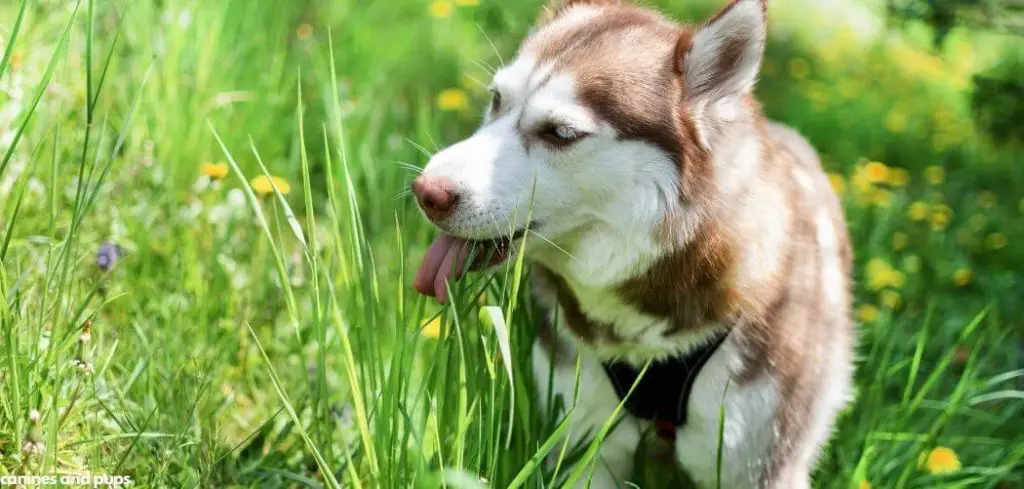A dog that frequently licks its paws while also eating grass may be signaling discomfort, stress, or an underlying health issue.
These behaviors, while sometimes seen as normal quirks, can indicate allergies, gastrointestinal upset, or behavioral problems that need attention.
We outline the common reasons why a dog may keep licking its paws and eating grass, what you can do at home, and when to seek veterinary help.
Dog Keeps Licking Paws and Eating Grass — Why It Happens
When dogs engage in paw licking and grass eating, the behaviors often stem from a combination of physical irritation and digestive needs. Dogs may lick their paws due to itchiness, irritation, or stress, while grass eating is sometimes linked to nausea, boredom, or dietary deficiencies. Allergies, infections, gastrointestinal upset, or anxiety can all contribute to these behaviors.
These behaviors can coexist due to a dog attempting to soothe irritation and digestive discomfort simultaneously, making it important to understand each symptom in the context of overall health.

Dog Keeps Licking Paws and Eating Grass: Common Causes
Allergies
Environmental or food allergies often trigger paw licking. Irritated paws can become inflamed, leading dogs to lick excessively, while allergic reactions may also cause mild gastrointestinal upset that prompts grass eating.
Symptoms may include red, itchy skin, hair loss, and recurring ear infections.
Untreated allergies can lead to secondary infections and chronic discomfort, so early management is important.
Read more: Dog Breathing Heavily and Limping (Here’s Why)
Gastrointestinal Upset
Nausea, gastritis, or other digestive issues can drive dogs to eat grass in an attempt to induce vomiting and soothe their stomach.
At the same time, discomfort or stress from gastrointestinal irritation may cause a dog to lick its paws.
Vomiting, diarrhea, reduced appetite, or lethargy often accompany these behaviors, signaling the need for veterinary evaluation.
Behavioral Factors
Stress, anxiety, or boredom can result in compulsive paw licking and grass consumption.
Dogs may use licking as a calming mechanism while turning to grass eating out of curiosity or as a repetitive behavior.
Triggers include changes in routine, separation anxiety, or lack of environmental enrichment. Addressing mental stimulation and behavioral interventions can help reduce these habits.
Oral or Paw Injuries
Cuts, abrasions, or foreign bodies in the paws or mouth can cause pain and discomfort.
Licking the paws is a natural response to relieve irritation, and stress or nausea from pain may lead to grass eating.
Swelling, bleeding, limping, or reluctance to play can indicate injury that requires prompt veterinary attention.
Nutritional Deficiencies
Some dogs eat grass in response to nutritional gaps, particularly in fiber or certain micronutrients. This behavior may coincide with paw licking if dietary deficiencies cause mild discomfort, digestive upset, or stress.
Ensuring a balanced, high-quality diet helps reduce both behaviors while supporting overall health.
Parasites
Fleas, ticks, or intestinal worms can lead to paw irritation and gastrointestinal discomfort.
Dogs may lick paws due to flea bites or skin irritation, and eat grass in response to mild stomach upset caused by parasites.
Signs include scratching, redness, visible parasites, weight loss, or soft stools, all of which require veterinary intervention for proper treatment.
What to Do If Your Dog Keeps Licking Their Paws and Eating Grass
Monitor the frequency and patterns of your dog’s behaviors to identify triggers. Keep notes on when and how often paw licking and grass eating occur, along with any related symptoms like vomiting, diarrhea, or lethargy.
Maintain paw hygiene. Clean your dog’s paws after walks or exposure to potential allergens to reduce irritation, and inspect for cuts, splinters, or foreign materials that may be causing discomfort.
Address diet and nutrition. Ensure your dog receives a balanced diet with adequate fiber, vitamins, and minerals to reduce potential dietary causes for grass eating and paw irritation.
Provide environmental enrichment. Exercise, playtime, and mental stimulation can reduce stress or boredom-driven behaviors.
Treat minor irritations promptly. Topical treatments or mild antiseptic washes can soothe irritated paws, but persistent or severe symptoms should be evaluated by a veterinarian.
When to Call or Visit Your Vet
Seek veterinary attention if paw licking or grass eating results in open sores, bleeding, persistent vomiting, or noticeable weight loss.
Other concerning signs include limping, swelling, redness, foul odors, lethargy, or refusal to eat.
A veterinarian may perform a comprehensive exam including skin assessment, stool analysis, parasite checks, and dietary review.
Early intervention can prevent secondary infections, address underlying gastrointestinal or nutritional issues, and provide guidance for behavioral management.
Behavioral concerns should also be evaluated if physical causes are ruled out. A professional can recommend enrichment strategies, behavior modification techniques, or treatment for anxiety-driven behaviors.
Read more: Dog Licking Paws Excessively (What it means and what to do)
Key Takeaway
Paw licking combined with grass eating can signal allergies, gastrointestinal upset, behavioral issues, injuries, nutritional deficiencies, or parasites.
Observation, cleaning, balanced nutrition, and mental stimulation are essential steps in managing these behaviors.
Persistent, worsening, or painful symptoms should be evaluated promptly by a veterinarian to ensure your dog’s comfort, health, and happiness while addressing the underlying causes effectively.
